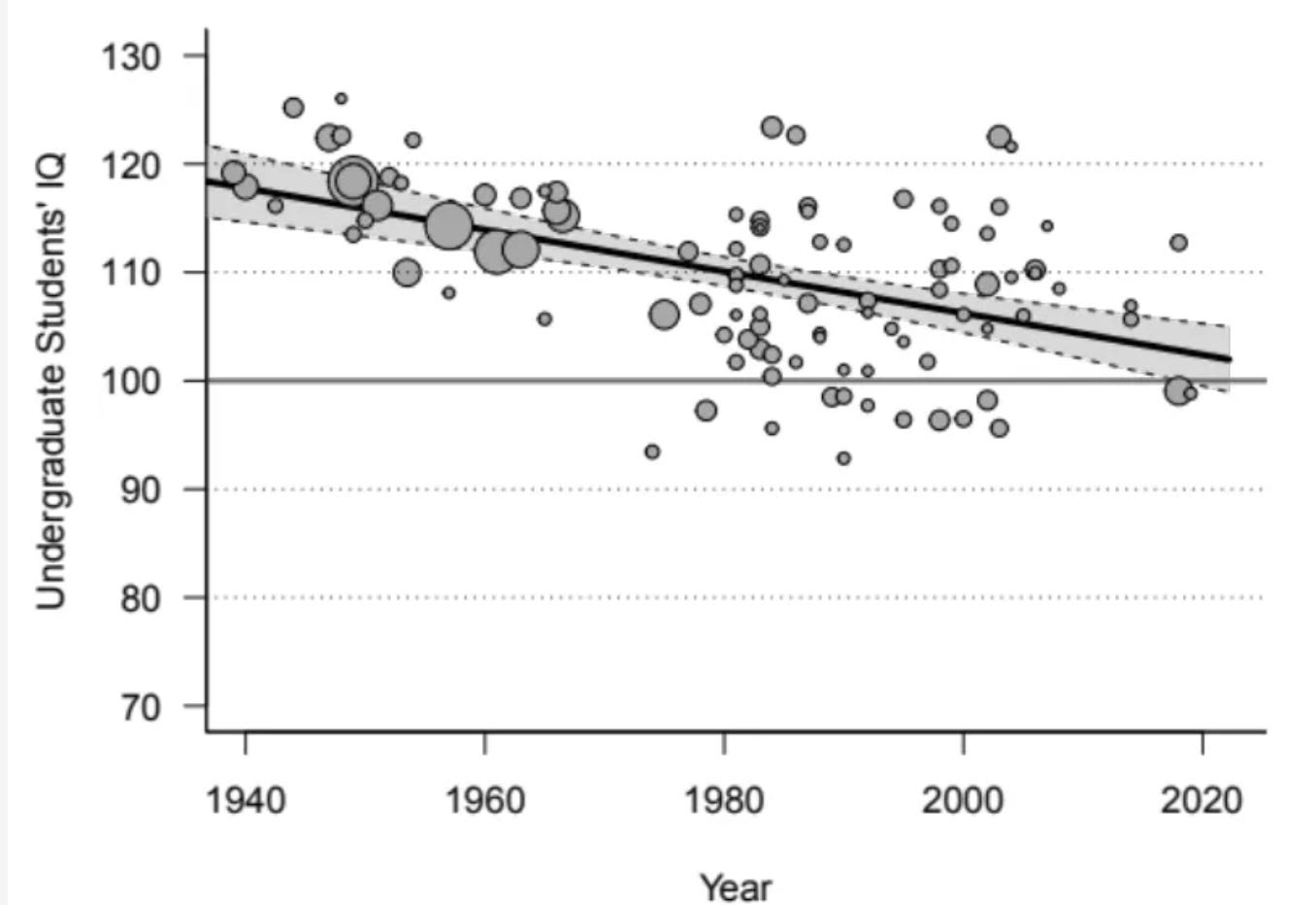My dad was born in December of 1939 and graduated at the top of his class from high school in 1955. That meant something at that time, as up to half of kids didn’t make it that far. Being a ‘55 high-school grad meant you were literate and numerate, had read some basic Shakespeare, knew trigonometry and geometry, and more. Dad cleaned out some boxes in the basement in the 1990’s and showed me some of his old tests and textbooks, which were the equivalent of my first and 2nd year university courses in the late 80’s.
Not only did he get through high school, but he went to university. This put him in an even more rarified category, as only around 6% of kids of his cohort went to university. One had to be a pretty smart cookie to do so.
What does a high school degree mean now?
It’s no secret that standards have been lowered.
“Individualized progress plans” or IPP’s became a thing: a system where standards were lowered enough for a student that he could “pass” a course without actually meeting the real standard. We now accommodate students for all kinds of “learning disabilities”. But “Chris has a math learning disability” and “Chris can’t do math very well” is a distinction without a difference. (There are conditions like blindness, deafness, or dyslexia where a person can learn to do the same things if they are accommodated through braille, sign language, and specially presented lessons. The destination is the same for these students, they just need some modifications to the learning environment to get there. But standards aren’t lowered.)
We increasingly accommodate students for “mental health” issues as well, with notes from doctors and therapists saying things like: “Little Susie is not able to write exams due to an anxiety disorder, so must be accommodated by allowing her to write tests at home, or using alternative testing methods”. (Never mind that tests are not just designed to gauge a student’s knowledge, but also to see if they have the ability to recall and use that knowledge under stress and time pressures.)
At first, it was just high school. Teachers lamented being encouraged/forced to pass students who did not meet minimum standards. Employers lamented that the high school grads they hired sometimes couldn’t read, write, or add - either well, or sometimes at all.
But don’t worry, we’ll weed them out in university!
The race to the bottom in high school graduation standards led employers to demand a university or college degree in order to be confident that a new hire had the basic skills (and, let’s be honest, IQ) to complete tasks. Universities responded to the increased demand by creating more and more capacity, and students responded to this burst of credentialism by heading off to uni in droves. The increasing failure of increasingly expensive government-run high schools meant that mostly-government-funded universities had to expand massively. A win for bureaucrats!
But a predictable thing happened. As universities became less selective, the average quality of university entrants declined, as measured by how smart they are. One can quibble with exact numbers, but the average IQ of a university student has clearly fallen. Back when my dad went, it was around 120 - an IQ that puts a person in the top 10% of the population. Nowadays that number has fallen to 102, which makes you pretty much average (average being 100).
Furthermore, keep in mind that this average is dragged upwards by the presence in the university cohort of a lot of very smart people. Despite the broader admissions pool, universities still admit MIT nuclear physics students and other Elon-Musk-Grade certified geniuses. So statistically many grads must be of below average intelligence in 2024 to balance out the Musks and bring the average down to… average.
We’re all above average!!
Add to this the issue of grade inflation in universities. As a higher percentage of high school students attended, and average student IQ dropped as a result, magically these same students became more and more capable of achieving an A grade! Amazing!!
The complete unreliability of high school - and now university - graduation as a predictor of intelligence means that it now behooves medical schools to be VERY careful in their admissions processes. Just because a student has decent university grades does NOT mean that student is smart enough to be a competent physician.
We’re heading the wrong way!!
And yet, rather than tighten requirements and rely more and more on objective measures like the MCAT (Medical College Admissions Test), medical schools are doing the opposite.
I should point out that this is not a new phenomenon, but has been brewing for a while. Let me tell you a story…
Twelve years ago or so I had a medical student from McMaster. I won’t go into detail on their process, but Mac has long been notorious in Canada for having “softened” its entrance requirements to admit students with better “people skills”. The student in question had a 3-year degree in sociology and had been heading down the social worker road when she decided to take a flyer on getting into meds. Et voila! She was pleasant and well kempt, and a very “nice” person.
But her poor knowledge base was very apparent, and her lack of problem-solving skills quickly showed. In short, she was slow on the uptake and a challenge to get concepts across to. Which is not good in a fast-paced ER learning environment.
The most striking example of her deficiencies occurred when we were trying to calculate some numbers on the fly. A patient had lost a lot of blood. We estimated 25%. How much blood was in this person’s circulation before the accident? We estimated about 6 litres. OK, I asked, so what’s 25% of 6. She looked flustered, as the patient lay there in shock. “I’m not good at math” she said. I thought I must have asked the question wrong, so I rephrased: “One quarter of 6” I said, “just simple math”. She looked upset and stressed. “I’ll go get my phone” she said. I rephrased again. “If you were out with 3 of your friends and had to split a 6 dollar tab, how much would each of you need to pay?”. At that point she looked like she was about to cry and said “I don’t do things in my head. I need a calculator.”
Imagine if she was under time pressure and trying to calculate a dose of drug for a paediatric patient. A typical calculation would be “This child is 17kg and the drug dose is 20mg/kg/day split into 3 equal doses”. Picture her punching a decimal point in the wrong place, and accidentally giving the kid ten times the recommended dose. I’m not sure if “I’m not good at math, your honour” would be a sufficient legal defence in court. Even if using a calculator, a doctor should be bright enough to double check in her head.
My old cleaning lady (God rest her soul) was very “nice” and excellent at cleaning our house. But it didn’t qualify her to be a physician. “Nice” sadly has to remain secondary to “not so dumb as to be at high risk of killing people”. I have heard MANY patients over the years talk about certain doctors and say “sure he’s a bit cranky and he doesn’t have the best bedside manner all the time, but he sure know’s what he’s doing”. Conversely
Be Afraid, be Very Afraid…
This is why we should be VERY, VERY afraid of what the newly named Toronto Metropolitan University or TMU (the woke-rebranded Ryerson) is doing with their med school admissions.
The MCAT is a challenging, standardized test which is completely agnostic to your race or gender. You either know math and organic chem or you don’t. You can either read well or you can’t. It was a good way to separate wheat from chaff, since someone with a 99 average in their Modern Dance undergrad may actually not be nearly as smart as someone with an 85 average from MIT physics. The MCAT helps fairly and objectively cull applications. Even though med schools were already being very “flexible” with certain applicants in terms of admitting those with lower scores if from a preferred group, the MCAT was still “discriminating” against the wrong people. So it was axed altogether by TMU.

Furthermore, TMU lowered their GPA minimum, or “floor” to 3.3. Compare this to the 3.95 average GPA of a successful UofT med school applicant, which means they in the top 5% of their cohort. How elite is a 3.3? Not very. Depending on the course and the university, somewhere from 20-40% of students are awarded a 3.3 or higher GPA. Recall from above that the average undergrad is now of average intelligence. And now med school will take many average-ish undergrads.
TMU’s website states:
So much for med students being the best and the brightest. “Minimizing barriers to entry” and “We are not selective about who we admit” mean the same thing. And I’m not sure about you, but I really, really want that vascular surgeon doing the notoriously difficult operation on my aorta to have been HIGHLY selected.
Martin Luther King is spinning in his grave
TMU has overt racial quotas. 25% of students must be black, 25% indigenous, and 25% from an “equity-deserving group” (a term which implies that some groups deserve equity while others don’t - some animals are more equal than others at TMU). So much for judging people on the content of their character. And if you follow the links to their admissions “pathway” information, they clearly state even the very soft 3.3 GPA isn’t a hard-and-fast minimum, but rather can be flexible in the right circumstances. I can only surmise this means when a student with the desired characteristics doesn’t meet the standard, they can lower them further.
This has been happening for some time
This lowering of standards to increase admissions from designated victim groups has been happening for some time, both covertly and overtly. A few years ago I was removed from the Dalhousie Medical School admissions committee for opposing a plan to double down on this push. (Diversity of skin colour is required, but diversity of opinion is not permitted). I dared to suggest that lowering standards further was not a safe approach, and was insulting to minority populations as it implied that they weren’t capable of reaching the higher standard. I heartlessly suggested that a more respectful and less harmful approach was to reach out to minority communities and help their students attain the necessary standard. I was contacted within a few days of the meeting and told I was no longer a “good fit” for the committee.
So despite the concerns of many, in the name of promoting “equity”, Dal and many other universities have special unequal “pathways” for admissions or, put another way, they have lower standards for people who are not white. Except for those pesky Asians of course, who seem to have no problem getting into med schools despite not being white. While only 5-6% of the population, they make up over 20% of med school classes. Maybe it’s because they apply themselves to schoolwork more than any other group that they succeed more frequently? Unfortunately for them, they are “white adjacent” and therefore are not “equity-deserving”. Tough break Asians!
All Canadian (and most US) med schools are competing in the “equity through lowering standards” race to the bottom. In addition to all that I’ve written, more and more med schools are factoring in an “adversity score”, and you can even read about how to write a good “adversity essay”, to increase your chances of admission by pointing out just how hard you had it growing up.
This SHOULD shake your faith in the medical profession
Faith in doctors and hospitals fell from about 70% in early 2020 to 40% in 2024. I, for one, look at that as a positive sign. It shows that the public is waking up and paying attention to a medical profession that has been subverted by Big Pharma and captured regulatory bodies, and brought under the strong-arm control of a draconian public health tyranny and less-and-less-independent medical regulatory overlords who force doctors to comply-or-else.
The lowering of standards and introduction of overt racial quotas for med school admissions will further erode trust in doctors. And it should.
Sadly, it will be more destructive to the trust we have for non-white physicians, since it is now explicit that minorities will have an easier time getting into med school. In coming years, a patient will understandably question the competency of his doctors, and more so if that doctor is from an “equity-deserving” identity group.
As an aside, don’t expect incompetent med students of any race to fail out after admission. That’s another Substack, but we do NOT have good mechanisms in med school to fail substandard students. 96% of those who start med school finish and become physicians.
Would you want to be the preceptor who marked an “F” on this woman’s evaluation if it were to turn out that she were incompetent? How do you think that might go in the current university environment? How quickly would a human rights tribunal be called? How quickly would the preceptor be labelled racist?
Med schools are for promoting excellence, not equity
Our society already constantly redistributes wealth from rich to poor to produce more “equity”. Top earners pay a hugely disproportionate amount of the total tax take, in order to fund massive government programs that provide free education, subsidized housing, employment training, early childhood education, and more. Even if you believe in “equity” as a goal, we are already doing a huge amount to promote it. The med school admissions process needs to be about careful selection and appropriate discrimination. It is clearly not the place to try to make society “equitable”.
In placing equity above excellence, med schools are in a race to the bottom. And by doing so, they are putting patients’ lives at risk. Med schools should not discriminate based on race, but they damn well SHOULD discriminate based on ability, IQ, and academic performance. Having standards is the same thing as “discriminating”.
Ah well, at least they are not going to lower standards for pilots, so we can still feel safe flying.


















Bang on. Excellent summation of the current sad state of affairs. I wish the public's "awakening" to the deterioration in medical standards also heralded a solution to this mess... but I won't hold my breath.
I may have related this tale some time ago in this space, but some time ago I had a flagrantly AWFUL med student with me on two successive ED shifts - so awful he'd have made your math-challenged student doctor look like Einstein.
I tried my best to offer pointers for "remediation" during my time with him, but he was also cursed with the inability to accept constructive feedback. All of this I laid out in my subsequent formal evaluation of his performance — and for my efforts I was the one hauled in front of various committees and made to feel as if I was the one who was deficient, as an educator.
Leave aside that while I may not be the greatest teacher in the world, I've garnered a few clinical teaching awards over the years.... I was the problem, see, NOT the student... who got his MD degree despite his glaring inadequaces (it's almost impossible to turf someone from med school these days once they're in), and is now on on his way to becoming an orthopedic surgeon.
God forbid he every lays hands on any of my family members.
There’s a couple of generations that grew up expecting rewards for participation. Now they expect to be admitted just because they applied, a degree just because they were admitted, a job just because they got a degree, high pay because they have a job, and a roof over their head just because.